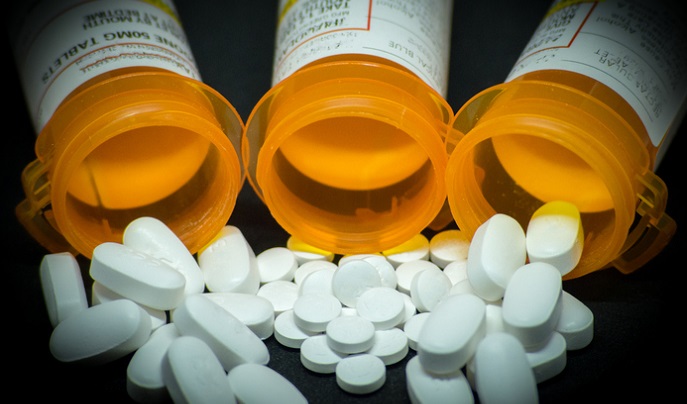Genetic Data Identifies Drug Targets to Treat Early COVID-19
Using genetic data, researchers found that drugs targeting two proteins could keep COVID-19 patients from being hospitalized.

Source: Thinkstock
- An analysis of genetic data indicates that leaders should prioritize clinical trials of two proteins – IFNAR2 and ACE2 – to better treat COVID-19 in its early stages.
In a study published in Nature Medicine, researchers used genetic data to identify drugs that can be repurposed for treating COVID-19. In the past, researchers have used large-scale human genetic studies to inform drug development programs, with some research identifying COVID-19 drug targets.
"The reason we used human genetics is as follows," said Juan P. Casas, a physician epidemiologist at the Veterans Affairs Boston Healthcare System and leader of the study.
"Given that more than 90 percent of drugs target a human protein encoded by a gene, the opportunity is there to use genetic variants within those druggable genes as instruments to anticipate the effects that drugs targeting the same protein will have. In other words, genetic studies that used variants within druggable genes can be conceived as natural randomized trials."
The team wanted to identify all genes that encode proteins that served as targets for FDA-approved drugs or drugs in clinical development. Researchers referred to this group of 1,263 genes the actionable druggable genome. The genes were from two large genetic datasets that totaled more than 7,500 hospitalized COVID-19 patients and more than one million COVID-free controls.
READ MORE: Genomic Data Reveals COVID-19 Variants Contribute to Surges
By comparing the genetic profiles of the hospitalized patients and the controls – as well as looking at which drugs target which genes – researchers were able to identify the drugs that will most likely prevent severe cases of COVID-19 that will cause hospitalization.
The two datasets were VA’s Million Veteran Program (MVP) and the COVID-19 Host Genetics Initiative, a consortium of more than 1,000 scientists from over 50 countries working collaboratively to share data, recruit patients, and disseminate information.
"This study gets to the heart of why we built MVP," said Dr. Sumitra Muralidhar, director of the Million Veteran Program. "It demonstrates the potential of MVP to discover new treatments, in this case for COVID-19."
Based on their analyses, the research team is calling for prioritizing clinical trials of drugs targeting the proteins IFNAR2 and ACE2.
IFNAR2 is the target for approved drugs often used by patients with relapsing forms of multiple sclerosis, a central nervous system disorder.
READ MORE: Using Genomic Data to Boost Population Health During COVID-19
The team believes that the most promising ACE2 therapy against COVID-19 is a drug that was developed before the pandemic began and has been evaluated in clinical trials to reduce inflammatory response in patients with severe respiratory disorders.
"When we started this project early last summer, most COVID-19 trials were being done on hospitalized patients. Very few treatments were being tested to give to patients early in the natural history of the disease. However, as the availability of testing against coronavirus increased, an opportunity opened to identify and treat COVID-19 patients before they progress to more severe forms that require hospitalization,” said Casas.
"The problem we tried to overcome is how to identify if existing drugs, either approved or in clinical development for other conditions, can be repurposed for the early management of COVID-19. Most commonly used strategies for drug repurposing are based on pre-clinical studies, such as experiments in cells or animal models. However, those types of studies may have problems of reproducibility or difficulties in translating their findings to humans. That usually leads to higher rates of failure in clinical trials."
ACE2 is very relevant to COVID-19 because the virus uses that protein to enter human cells. The most promising ACE2 therapy against COVID-19 is the drug APN01, which mimics the protein. The drug works by confusing the virus so it attaches to the drug instead of the ACE2 protein in the human cell.
“If our genetic findings are correct, there's a need to test this strategy in clinical trials in COVID-19 outpatients," Casas said.
READ MORE: Majority of COVID-19 Hospitalizations Due to 4 Chronic Diseases
The IFNAR2 protein serves as the target for a drug family known as type-I infections, one of which is interferon beta. That drug is approved for treating patients with a degenerative form of multiple sclerosis. Researchers showed that people with a certain variant of IFNAR2 had less chance of being hospitalized with COVID-19 compared to people without the variant.
Researchers are currently planning a clinical trial to test the efficacy and safety of interferon beta in COVID-19 outpatients in VA. If the genetic findings are confirmed by a trial, the goal is to prescribe the drug to after people are diagnosed with COVID-19 but before they need to be hospitalized.
The team expects that even with ongoing global vaccination campaigns, there will be a continued need for drugs to treat people in the early stages of COVID-19.
"This is largely due to two reasons. First, it will take some time to achieve the high levels of vaccine coverage needed to create herd immunity. In addition, certain coronavirus variants are emerging that seem to lead to a reduced vaccine efficiency. We are not yet in the clear,” Casas concluded.
